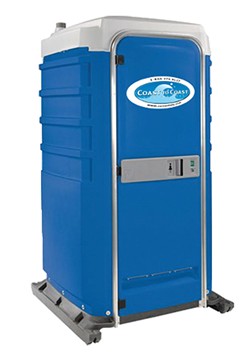Wasted Space
Lack of canyon restroom facilities brings tainted water issue to light.
By Dylan Woolf Harris @dylantheharrisA lawsuit filed recently by Cardiff Canyons Association accuses the Mountain Accord of violating Utah's Open and Public Meeting Law. The civil complaint is perhaps the most visible example of opposition to the interlocal plan, which aims to preserve popular forested canyons along the Wasatch Front. The Mountain Accord executive board has been accused of failing to post meeting notices and excluding critics from sitting in discussions. However, Salt Lake County Mayor Ben McAdams, who chairs the Mountain Accord, categorically denies claims that the public has been left out of the process.
But for some, keeping human waste out of the watershed is more pressing than cries of transparency.
Big Cottonwood Canyon resident David Eckhoff, a general supporter of the Mountain Accord, says future plans need to address a growing demand for bathroom facilities. "I don't invite people to my house, then preclude them from using the toilet," he told the county council, as it considered support for the formation of the Central Wasatch Commission, a governing body essentially in charge of implementing the Mountain Accord.
Eckhoff says it's unconscionable that leaders can't "provide anything close to adequate toilets in the canyon. We can't blame the Forest Service because their budget is just too meager and there's not much prospect that they're going to increase."
If the Mountain Accord is designed to tackle environmental problems, he says, guarding the forest floor from urine and defecation should be on the to-do list.
Larry Lucas, recreation program manager for the Uinta-Wasatch-Cache National Forest, confirmed overall funding for the federal agency is trending in the wrong direction. He says, for example, "in 2009, we had about $4.6 million to manage trails on the entire forest. It's down about $3.3 million this year."
Lucas is aware of the skyrocketing demand for restroom facilities, and he says most of the popular recreational day-use destinations have them. Hikers who wander into spots of natural solitude, however, will find themselves too far removed from a toilet when nature calls. "As more and more people come, though they're going to stray off the side of the trail and go in places that really don't have those accommodations, or they just pull off the side of the highway," he says, thereby upping the odds that human waste filters into the water.
The Forest Service notes that during peak visitation, the trails, bathrooms and parking spots hit capacity. The influx of recreation will only be exacerbated as the valley's population continues to balloon. For that reason, Lucas says, the Forest Service favors the Mountain Accord.
Although land in the canyon is managed by the feds, state law allows cities to manage watersheds that supply drinking water, even when those watersheds are outside the city limits. Salt Lake City has jurisdiction over the watershed supplied by nearby canyons, including Big Cottonwood, Little Cottonwood, Parley's and City Creek, and it regulates water through an ordinance.
"Sanitary issues are a big deal in our watershed," says Laura Briefer, director of the Salt Lake City's public utilities department. "In fact, it's one of the potential threats or vulnerabilities to water quality." Fecal matter, a vector for harmful bacteria such as E. coli, in the watershed is worrisome, she adds.
The city maintains a few canyon restrooms, but a deluge of visitors in the past few years has put more pressure on those facilities. Treatment plants at the mouths of the canyons help clean water running to the cities, but they can't be counted on to purify everything.
"They'll remove pathogens but there are some pathogens that can break through the system. ... It's really important to manage that correctly," she says. "It's also really important for people to take responsibility for themselves, too. Go to the bathroom before you go out for your hike, use the trailhead restrooms."
Briefer says a shortage of bathrooms is one spoke in a struggling wheel. The issue for policymakers will be to strike a balance between protecting resources in the canyon, such as the water, while allowing citizens to enjoy the canyons' stunning beauty.
"One fear that I have is that these mountains get loved to death, and we degrade that watershed," Briefer says. "I think we need to take a broad approach. That's what Mountain Accord was trying to do and still is. How can we best make some decisions to manage for the future, to manage all of these demands?"
In conjunction, a federal bill sponsored by Rep. Jason Chaffetz, R-Utah, was vetted at a congressional hearing last week. It would designate more than 79,000 acres as a "conservation and recreation" area. This bill, however, would not relinquish the city's management of the watershed, Briefer says.
More by Dylan Woolf Harris
-
Dabakis Is Leaving the Building
Ever boisterous and outspoken, state senator says lending liberal voice trumps his bill tally.
- Apr 4, 2018
-
Gagged and Bound
Row between South Salt Lake and muralist gets the burlesque treatment.
- Mar 21, 2018
-
Inland Port Authority Update
Gov. Herbert signs contested bill into law.
- Mar 16, 2018
- More »
Latest in News
Readers also liked…
-
Raise a glass for E.L.T Harrison, architect of the Beerhive building on Main
Small Lake City
- Oct 11, 2023





